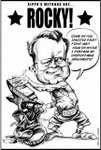Tuesday, October 30, 2007
Where have you been, Art?
Hi folks! I have been recuperating from an operation and during that time, I was doing several medical opinions for attorneys. It left me with little time to get my thoughts together. I am now back at regular work and I will get into the swing of things. There will be more posts to to come!
Subscribe to:
Post Comments (Atom)




3 comments:
Dr. Sippo, Oh Dr. Sippo, where for art thou Dr. S?
Dr. Art, help me understand the topic concerning William Webster's claim about the canon..
here are the links:
http://art-of-attack.blogspot.com/20...ebster-on.html
WEBSITE OF MR. WEBSTER
http://www.christiantruth.com/sippocanon.html
Mr. Webster makes 2 allegations:
1) That there is a difference between the Canon of the COuncil of Hippo in 393 AD and htat ofhte Council of Trent. Spcifically, he alleges that the "2 books of Esdras" at Hippo included the Apocryphal book of Esdras while Trent did not.
2) That the OT Deuterocanon was never part of the Catholic Bible until the Council of Trent.
He is wrong on both counts.
The title "2 books of Esrdas" had been used in the Church for over 150 years (i.e., since the itme of Origen and the Hexpla) to refer to the hebrew book of Ezra and Nehemiah. This was also what St. Jerome included in the Latin Vulgate which was composed under Papal sponsorship. It just so happens that he was working on the Ezra and Nehemiah translations in 392-393 AD. This was also the way the books were understood in all of the Bibles from the late 4th Century onwards, in the Glossa Ordinaria, and at subsequent Ecumenical Councils including Nicea II, Florence and Trent.
WHenever the Magisteirum ofhte Church was questioned about the Canon in the Patristic and medieval periods, the Popes and Church Councils UNIVERSALLY acknowledged the OT Deuterocanon as inspired.
What Mr. Webster refuses to admit is that the Catholic Church has CONSISTENTLY believed in the Canonicity of the OT Deuterocanon despite the objections of individual scholars and that the Protestant rejection of the Deuterocanon was a innovation and thus by definition a heresy.
Art Sippo
Post a Comment